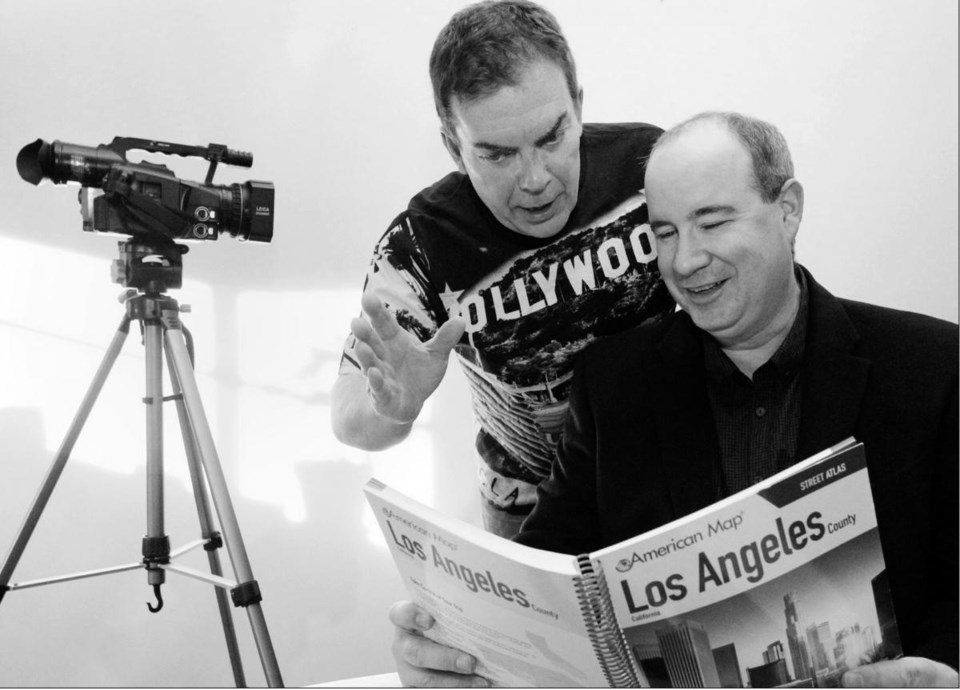Like the South Park song says, blame Canada.
That's what Ian Ferguson and Leslie Bland are doing - tongue-in-cheek, naturally - with Gone South: How Canada Invented Hollywood, their documentary to be launched next year with publication of Ferguson's book of the same name.
"I'm not Ken Burns," deadpans Ferguson, dismissing any notions their feature-length film might be mistaken for one of the legendary documentarian's epics on topics from jazz to baseball.
"It's more like [Morgan Spurlock's] Super Size Me in terms of tone," explains Bland, the UVic theatre instructor and former artistic director of Kaleidoscope Theatre.
"With slightly less regurgitation," jokes Ferguson, his partner in Victoria's Less Bland Productions.
Gone South explores the history and influence Canada has had on the development of American pop culture, says Ferguson, the award-winning author, humourist and playright best known for his idiosyncratic childhood memoir Village of the Small Houses and How to be a Canadian, the bestseller he co-wrote with his brother, Giller Prize-winning author Will Ferguson.
Less Bland Productions has just signed a broadcast licence with Super Channel for Gone South's first broadcast window after its festival rollout, theatrical release - in Canada by Kinosmith - and on pay-per-view.
Their lighthearted project will provide a historical overview from the days of Mack Sennett, the Quebec-born actor and director credited with creating the Keystone Cops and discovering Charlie Chaplin, with interviews with Canuck celebrities in Hollywood. In lieu of typical talking-heads footage, they plan to shoot conversations with stars engaged in activities, such as potential sequences in which Lost star Evangeline Lilly would point out Canadian stars on Hollywood's Walk of Fame.
If he's available, Martin Short might speak while shooting pool, or Jeopardy! host Alex Trebek could chat while slapping pucks around.
"As he's talking about Canadian game show hosts like Monty Hall, we'd shoot him playing hockey," said Bland, illustrating the visual contrasts. "We'd see these Canadians keeping their culture alive in artificial, palm-laden L.A."
Gone South, made with funding from Rogers Documentary Fund, won't have a single host, Bland says.
"It would be jointly hosted by all these Canadian celebrities. The joke is that it's called the Canadian Mafia."
Maple Leaf luminaries they're approaching include Pamela Anderson, Paul Haggis, Nia Vardalos, Mike Myers, William Shatner and Adam Beach, who they hope to interview on horseback.
"If there's a native character played by an aboriginal actor in a movie, chances are they're Canadian," Ferguson says.
Bland uses Dances with Wolves, which features Graham Greene and Tantoo Cardinal, as a classic example.
"I think the entire cast was Canadian," he jokes before expanding on their dream shot that would showcase Beach.
"We'd widen the shot of him on horseback and you realize he's at the L.A.
Equestrian Centre with freeways in the background."
While Gone South isn't a sequel to How to be a Canadian, its style is in the same vein, Ferguson says.
"It intends to be a history of Canadians in Hollywood with the subversive message that without Canada there would be no Hollywood," he said. "It's an excuse for a lot of jokes and me getting to hang out with famous Canadians."
Ferguson came up with the idea during a trip to Los Angeles. He wondered why it hadn't been done before, especially given our historic associations with Tin-seltown, long before the term Hollywood North was coined.
Three of the first four Oscar winners for best actress were Canadian, he noted, including Mary Pickford, who became famous as America's Sweetheart despite being born in Toronto. Louis B. Mayer, who founded MGM, was raised in Saint John, N.B.
"We've always been able to pass for Americans," Ferguson observes. "Australians have to learn a different accent, but we just have to learn to say 'out' and 'about' the way the Americans expect and we'll be fine."
Gone South might compare being a Canadian celebrity in Hollywood, and here at home.
"A famous Canadian in Canada has to wear a name tag," quips Ferguson.
Their wish list includes Seth Rogan and William Shatner, whose comic dialogue for the 2010 Winter Olympics closing ceremonies was written by Ferguson's brother.
"I don't think you're allowed legally to talk about Canadians in Hollywood without talking to William Shatner," Ferguson said.
Rogen excites them, they say, because he represents "the new generation" of Canadian movie stars.
"Canadians have played starship captains and medical doctors, but a Canadian slacker? I mean, honestly ..." said Ferguson, who would also love to snare his idol, Gordon Pinsent, and Paul Gross.
"I think Paul Gross gets up every morning, looks in the mirror and says, 'I want to be Gordon Pinsent,' " Ferguson says.
The duo have several films and television series with potential international appeal in development, including Broad Comedy, a 13-episode series picked up by Aboriginal People's Television Network. It will showcase 26 female Canadian comedians when it shoots at Metro Studio next February.
Gone South is a passion project, however.
"It makes you mildly proud to be Canadian," says Ferguson. "And Canadians are never more than mildly proud about anything. Self-effacement rules."
mreid@timescolonist.com



